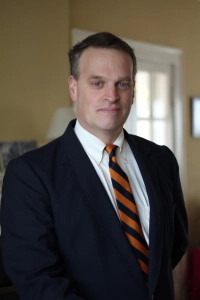At the outset of a new academic year those of us who have the privilege of working with students in that mysterious process that we call ‘education,’ are again confronted with the question about how we might succeed a little better in the new year than we all did in the previous one.
Unfortunately, the teaching profession is markedly different from every other profession in one prominent way: It is not safe to assume that a teacher will improve with experience.
In fact, I have heard it alleged that the educational world provides a relatively safe haven for those who are ill-equipped and perhaps even disastrous in their chosen profession as teachers. A disappointing thought, but a thought that bears some reflection.
Obviously, the object of teaching separates it from every other art or profession. Whereas the plumber might deal with copper pipe,

and the doctor concerns himself with the health of the body, and the sculptor shapes and forms marble… the teacher focuses on forming the human mind- the intellect. Clearly teaching is different from other professions in its object.
But let us consider at least four other ways that teaching is different from every other art.
1. The teaching profession is the only profession that, strictly speaking, has only one authentic member.
And His name is Jesus Christ.
As it is written,
As for you, do not be called ‘Rabbi.’
You have but one teacher, and you are all brothers.
Now it is not only clear from this text, but I have had it on authority from multiple sources that the word ‘rabbi’ means ‘teacher.’
Hence the King James version of this same passage reads,
And do not be called teachers; for One is your Teacher, the Christ.
So this should offer a small consolation to teachers who might be facing various existential crises about whether they are effective and good teachers. The answer is no they are not – because they are not teachers, in the primary sense of the word. They are only teachers in a secondary sense as I have lucidly explained here.
It must be nice to be a plumber or an accountant or a building contractor. At least they can feel pretty secure in being called what they profess to be. Teachers, on the other hand always have to keep in mind that they are not really teachers.
2. The teaching profession is the only profession that allows for repeated and continuous long-term catastrophic failure by its practitioners.
I suppose those of you who know more about working for State or Federal Government will correct me here, but how many professions, how many businesses can remain open for years and years when they fail to produce, or, even worse, intentionally destroy the product they are producing?
If a doctor repeatedly harms, maims, or even kills his patients, my hunch is that some oversight committee eventually catches up to him and calls him to account.

Or if an auto manufacturer produces cars that don’t work, are poorly designed, or are even dangerous, my guess is that such an auto manufacturer will eventually either change its modus operandi or go out of business.
The same goes for airplane and jet manufacturers. After one or two catastrophic crashes, the entire company is subject to relatively close scrutiny. At least that is what I thought.
But teaching is different. A single teacher can, for example, spend his entire career corrupting the minds of all of his students with false doctrine, heresy, or even just plain old bad doctrine without ever encountering a review board or any kind of censure. A teacher might even spend his entire career teaching nothing but falsehoods and lies and make a fairly good living at it. Is there another profession like this? Actually, it’s sort of amazing!
I can’t think of a better gig. It’s like a completely fail-safe profession. If I teach falsehood I get paid. If I teach the truth I get paid (although perhaps a little less).
3. There are no objective measures for effective teaching.
Isn’t that wonderful?
As a ‘teacher’ it is impossible for anyone to say with certainty that I am a total disaster or a prodigious success!
Other than God Himself, who can make the judgment? There are no objective measures.
When a student learns something I will, of course, take the credit gladly. But should a student fail to learn I can recite any number of reasons why it was his or her fault.
Standardized testing does not offer us any help either. The first reason for this is that standardized tests are unable to measure authentic learning. For example, there are never any questions on a standardized test that ask a student to reason, step by step, through an elementary proposition in Euclid’s Elements.
The second reason is that one can never be certain whether the excellent results obtained by one’s students on a standardized test has anything to do with what one ‘taught’ the student. The results are more likely a simple reflection of the student’s native intelligence.
With the mechanical arts, the case is radically different. Every auto mechanic receives a fairly direct and objective confirmation of his good or bad work simply by ascertaining whether the thing he was working on is actually fixed or whether the problem continues. Does the car start or doesn’t it?

A home builder will someday find out whether the homes he has built stand up or fail. If a roof collapses without the influence of any extraordinary climatic event, everyone is pretty certain that there was a fault in the construction. But it is very difficult to pin anything on a bad teacher.
4. Teaching depends mostly on a willing student who is also disposed to learn.
Who can blame a teacher, even a poor and ineffective teacher, for failing to make any sort of impact on a student that is simply unwilling to learn? Who can fault a teacher who is unsuccessful in teaching a student that is not disposed to learn?
But even more, who can blame a teacher for not improving in his art should he be continually provided with students who are unwilling or ill-disposed to learn what he is trying to teach?
Consider this – there are two requirements on the part of the student for learning. First, he must be willing to learn. Second, even if he is willing, he must also be disposed to learn.

There is no teaching without learning, and there is no learning without the learner’s cooperation.
But even if a student is willing to learn this does not mean that he is able to learn a specific subject. If a student is willing to learn Calculus but has never taken Algebra, it is unlikely that any Calculus teacher will ever succeed in teaching him. Likewise, a student who has never taken plane geometry is not disposed to learn solid geometry no matter how enthusiastic he is to learn!

Real learning is a matter of sticking to an order. Mere enthusiasm is not enough.
But the point here is that teaching differs from, say, carpentry in this way- the carpenter doesn’t have to wait until his lumber is in the proper mood in order to make a house. The electrician does not have to entertain and coax his wires to behave properly so that he can complete some kind of complex circuit. Teaching, by contrast, is singularly dependent upon the disposition of its object- the student.
There are carpenters, there are doctors, there are electricians and there are plumbers. But there are really no teachers if teaching has anything to do with the direct formation of the souls of students, except for one, Jesus Christ.





Very helpful distinctions. Thank you. It would be helpful to follow this cautionary article with your recommendations for how best to understand the role for those who wish to help facilitate learning in general and formation as disciples in particular. Would terms such as tutor, coach, facilitator, midwife, catechist, disciple, apostle, prophet, etc. be more appropriate?
Well, actually I don’t think I could have come up with a better list of terms to describe our role as facilitators of learning.
I guess following Socrates here we probably should have a preference for ‘midwife’. The term midwife also unmistakeably sends the message to the students that they are the ones that need to be doing the real intellectual ‘labor.’ Nonetheless, I suppose ‘tutor’ has the best chance at succeeding.